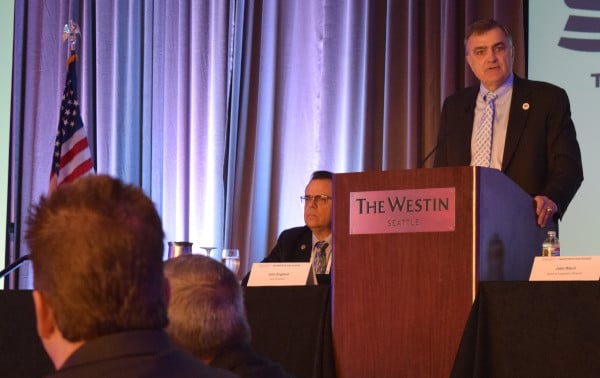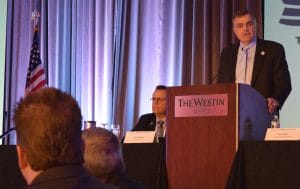
SEATTLE — SMART Transportation Division National Legislative Director John Risch gave attendees a broad overview of the landscape of the transit industry on the third day of the TD regional meeting.
Among the topics covered: how to grow support for transportation-related bills in Washington, D.C., train automation, operator safety, stock buybacks and the potential threat politicians pose to what they describe as “entitlements.”
“If you see something, do something,” Risch told the crowd, encouraging them to get involved by running for public office, engaging government officials face-to-face to educate them about the issues important to the transportation industry and being more visible at public meetings and in the media.
“It’s not me or our small office in D.C. that passes a crew bill,” Risch said. “That’s not the most effective way. The most effective way is when constituents contact them.”
He praised the grassroots efforts of Socorro Cisneros-Hernandez, a bus member out of Local 1607 in Los Angeles, who took it upon herself to meet Republican U.S. Rep. Paul Cook at a town hall meeting. After the discussion, Cook signed on to the Safe Freight Act (H.R. 233) as one of the 112 bipartisan members in the U.S. House who support the two-person crew bill.
General Chairperson Steve Simpson (GO 489) met with U.S. Rep. Louie Gohmert, a Texas Republican and one of the most conservative congressmen, and also was able to get Gohmert to sign on in support of H.R. 233 and to advocate for funding for the National Mediation Board, Risch said.
“This is a political year — they’re all ears. They’re all ears in the political years,” Risch said. “Once they get elected, they’re not quite as attentive.”
Risch said the responses received by the Federal Railroad Administration in a request for comments on automation in the rail industry largely agreed with rail labor’s approach — that all trains should have two-person crews.
“The vast majority, with a handful of exceptions from railroads, of the comments were comments saying the only safe way to be allowed to run a train through America is with two crewmembers — a certified conductor and a certified locomotive engineer,” Risch said. “It’s a safety issue — it’s an issue to where you need two people to get the job done.”
Two safety bills have been introduced in Congress — one to protect passenger rail workers in the Senate and one to protect bus operators in the House.
The House bill, introduced by U.S. Rep. Grace Napolitano of California and U.S. Rep. John Katko of New York, is a strong bill and if passed, would protect our bus members.
“It will require that bus companies develop risk-reduction programs, and not only do they have to develop them, they have to do it with their bus drivers and union representatives,” Risch said.
The programs would target areas on bus properties where safety could be improved, such as fixes for the vehicles, and de-escalation training, Risch said.
“Too often, the fare is a dollar-and-a-half and the guy’s only got a dollar getting on the bus and then the bus driver tells him it’s a dollar-and-a-half…and this 50-cent issue turns into something terrible,” Risch said.
Class I railroads received millions, if not billions of dollars back when the Tax Cut and Jobs Act cut the U.S. corporate tax rate last year. Risch reminded attendees what the railroads are using the money for rather than infrastructure and maintenance.
“They’re using it to buy back stock — elevate the stock price. Who are the biggest stockholders? — Top officers of the railroads and the hedge funds,” Risch said. “Those are the guys that are profiting. Union Pacific will spend twice as much money these next three years buying back stock than they will in investing in the railroad.”
The runaway debt that has been created by spending increases also has politicians eyeing what they describe as “entitlements” — among them Social Security, Medicare, Medicaid and Railroad Retirement. Politicians want to get their hands on the money that fund these “entitlements” – money that we’ve put in for our retirements – and bankrupt these programs.
“That’s the deal we’ve made — we’re going to pay in for 30, 40 years and then we would have a few years to enjoy retirement because we invested,” Risch said. “That was the deal — it was a pension plan. You can’t change that. We’re not going to stand idly by if they try to change that deal.”
Related News
- Razor blade found on brake wheel
- Coming Soon: SMART-TD Voluntary Income & Life Protection (VILP) Program
- Senate Passes Tax Bill Without Including Railroaders
- SMART-TD Honors the Retirement of Brother Greg Hynes: A Visionary, a Fighter, and a Legend
- SMART-TD Calls on U.S. Senate to Support the Cantwell Amendment and Protect Rail Workers
- Yardmaster Protection Act Introduced
- PHOTO GALLERY: 2025 Denver Regional Training Seminar
- Fighting for Stronger Heat Protections for Rail Workers
- Regional Training Seminar Sets (Mile-High) Record in Denver
- Registration Open for Anaheim Regional Training Seminar
